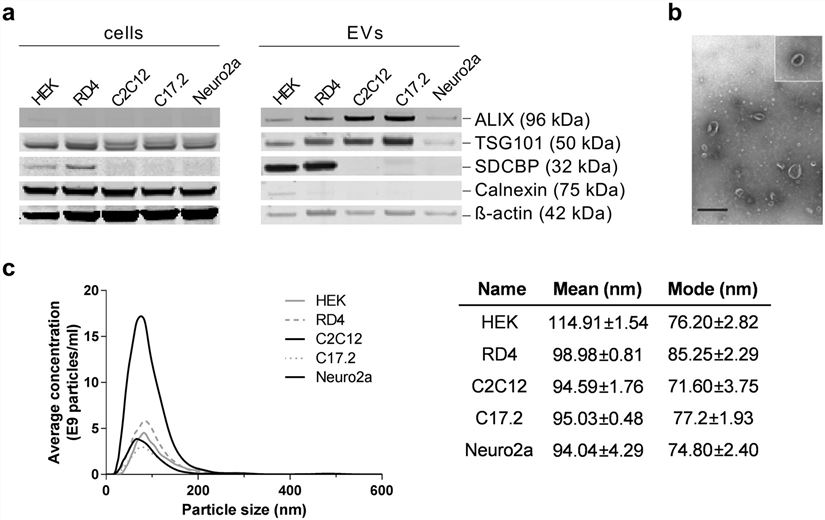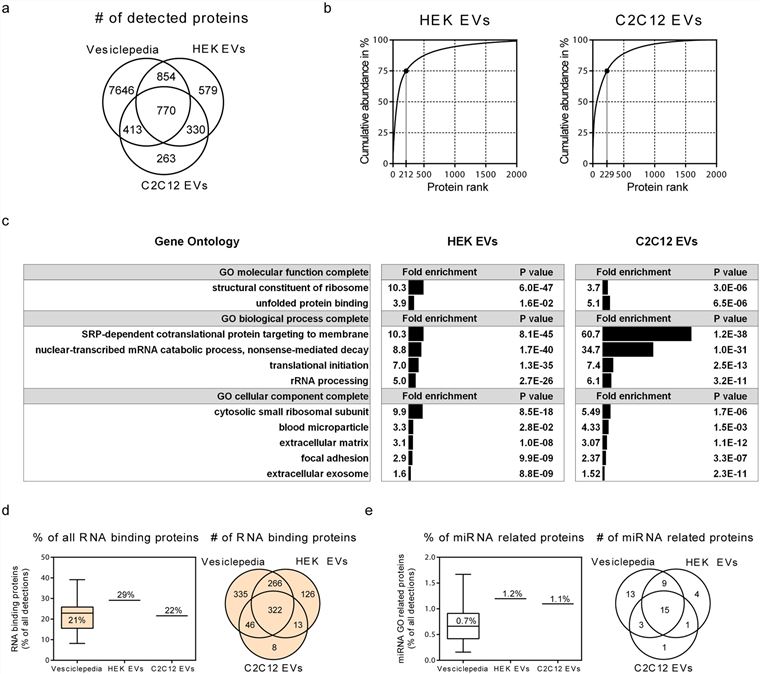Protein Isolation and Profiling Services for Extracellular Vesicle
Extracellular vesicles (EVs) are a type of vesicles naturally secreted by cells. Almost all types of cells can secrete EVs under physiological and pathological conditions. In recent years, EVs have attracted extensive attention due to their inherent biocompatibility, high stability, low immunogenicity, and their important role in intercellular communication. Accumulating evidence indicates that proteins are important building blocks of EV. These proteins can be widely involved in the information transmission between cells through internalization by target cells, receptor-ligand interaction, or lipid membrane fusion, and are crucial in various physiological and pathological processes. Therefore, EVs are considered potential drug delivery vehicles or disease diagnostic markers. Analyzing the protein composition of EV will help to promote the further development of EV research. Creative Biolabs can provide isolation and purification services for EV, characterization and quantification services for EV, EV protein extraction, and various protein analysis services to help customers identify and quantify the proteins in EV.
Qualitative and Quantitative Services for Specific Proteins in Extracellular Vesicle
-
Western bolt is the gold standard for detecting protein expression and can be used to detect various types of proteins in EV. On the one hand, after EV is formed and released, it will form its unique marker proteins (such as CD9, CD81, CD63, TSG101, etc.). We can use Western blot to detect these marker proteins to identify EV. On the other hand, if you are interested in other proteins in EV, you can provide antibodies or entrust us to purchase or recommend specified antibodies. We can use Western blot to detect your protein of interest.
-
The detection of protein content by enzyme-linked immunosorbent assay (ELISA) has the advantages of high sensitivity, rapid detection, and accurate results. We can perform qualitative and quantitative analysis of your protein of interest using ELISA. If you are interested in the content of certain proteins in EV, please list them to us.
-
Nanoscale flow cytometry detection is an advanced single-particle, multi-parameter, high-throughput nanoparticle quantitative characterization platform developed based on sheath flow single-molecule fluorescence detection technology, which is mostly used to characterize surface proteins of EV (such as CD9, CD81, CD63, etc.). Nanoscale flow cytometry detection only takes 2-3 minutes, and can detect multiple surface proteins of EV at the same time, which is suitable for large-scale detection of EV samples.
 Fig.1 Characterization of extracellular vesicles (EVs).1,2
Fig.1 Characterization of extracellular vesicles (EVs).1,2
Extracellular Vesicle Proteomics Service
There are many proteins in EV, and these proteins involve a wide range of functions. EV proteomics can currently be used to study the biological functions of proteins in EV in immune regulation, antigen presentation, cancer metastasis, tumor infiltration, angiogenesis, neurodevelopment, etc. It can also reveal potential diagnostic markers and therapeutic targets in EV. Our EV proteomics services are based on a bottom-up approach. That is, first extract the total protein in EV and enzymatically hydrolyze the protein into peptides, then use liquid chromatography-tandem mass spectrometry to analyze the peptide mixture, and finally realize the protein identification through database search. Most importantly, our professional bioinformatics analysts are proficient in using various bioinformatics analysis tools to deeply analyze and mine data to find the most promising EV protein for you.
 Fig.2 Proteomic analysis of HEK- and C2C12 EVs.1,2
Fig.2 Proteomic analysis of HEK- and C2C12 EVs.1,2
Creative Biolabs provides professional and comprehensive EV protein separation and analysis services to help customers efficiently qualitatively and quantitatively analyze proteins in EV. In addition, combined with the analysis of proteomics data by bioinformatics technology, we can help customers screen out the most potential proteins in EV. If you are interested in proteins on the surface or inside of EV, please contact us and tell us the source, quantity, and species of your EV samples. We will formulate the most suitable protein analysis plan for you and accelerate the progress of your project.
References
-
Sork, H.; et al. Heterogeneity and interplay of the extracellular vesicle small RNA transcriptome and proteome. Scientific Reports. 2018, 8(1):10813.
-
under Open Access license CC BY 4.0, without modification.
For Research Use Only. Cannot be used by patients.
Related Services:

 Fig.1 Characterization of extracellular vesicles (EVs).1,2
Fig.1 Characterization of extracellular vesicles (EVs).1,2
 Fig.2 Proteomic analysis of HEK- and C2C12 EVs.1,2
Fig.2 Proteomic analysis of HEK- and C2C12 EVs.1,2








